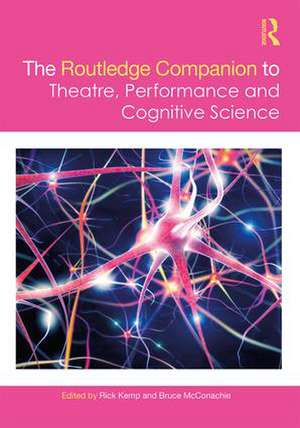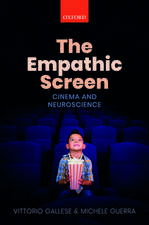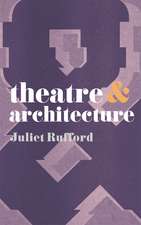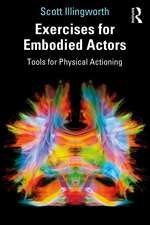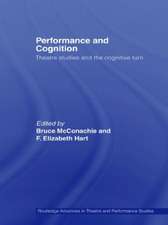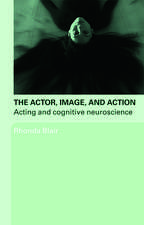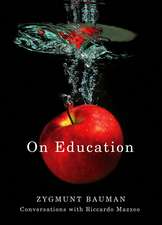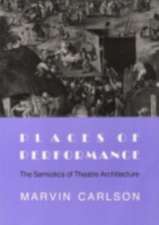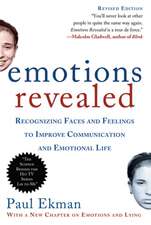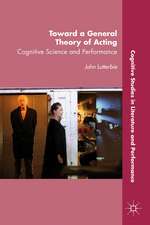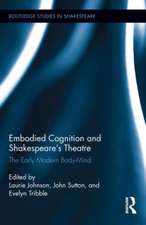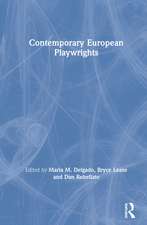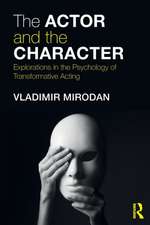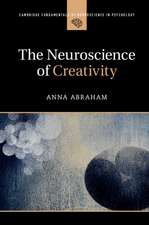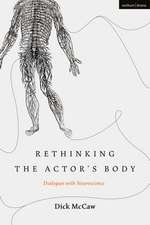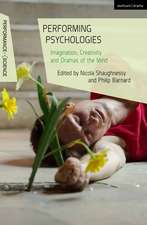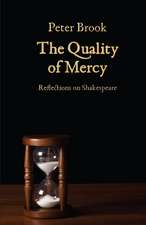The Routledge Companion to Theatre, Performance and Cognitive Science: Routledge Companions
Autor Rick Kemp, Bruce McConachieen Limba Engleză Hardback – 2 oct 2018
The Routledge Companion to Theatre, Performance, and Cognitive Science integrates key findings from the cognitive sciences (cognitive psychology, neuroscience, evolutionary studies, and relevant social sciences) with insights from theatre and performance studies. This rapidly expanding interdisciplinary field dynamically advances critical and theoretical knowledge, as well as driving innovation in practice. The anthology includes 30 specially commissioned chapters, many written by authors who have been at the cutting-edge of research and practice in the field over the last 15 years. These authors offer many empirical answers to four significant questions:
- How can performances in theatre, dance, and other media achieve more emotional and social impact?
- How can we become more adept teachers and learners of performance both within and outside of classrooms?
- What can the cognitive sciences reveal about the nature of drama and human nature in general?
- How can Knowledge Transfer from a synthesis of science and performance assist professionals such as nurses, care-givers, therapists, and emergency workers in their jobs?
A wide-ranging and authoritative guide, The Routledge Companion to Theatre, Performance, and Cognitive Science is an accessible tool for not only students, but practitioners and researchers in the arts and sciences as well.
Din seria Routledge Companions
-
 Preț: 341.06 lei
Preț: 341.06 lei -
 Preț: 294.07 lei
Preț: 294.07 lei -
 Preț: 334.02 lei
Preț: 334.02 lei -
 Preț: 347.69 lei
Preț: 347.69 lei - 9%
 Preț: 1605.61 lei
Preț: 1605.61 lei -
 Preț: 353.45 lei
Preț: 353.45 lei -
 Preț: 335.94 lei
Preț: 335.94 lei -
 Preț: 411.45 lei
Preț: 411.45 lei -
 Preț: 304.08 lei
Preț: 304.08 lei -
 Preț: 349.02 lei
Preț: 349.02 lei -
 Preț: 402.86 lei
Preț: 402.86 lei -
 Preț: 1058.83 lei
Preț: 1058.83 lei -
 Preț: 341.21 lei
Preț: 341.21 lei - 15%
 Preț: 466.78 lei
Preț: 466.78 lei - 34%
 Preț: 1219.65 lei
Preț: 1219.65 lei - 38%
 Preț: 1223.84 lei
Preț: 1223.84 lei -
 Preț: 360.99 lei
Preț: 360.99 lei - 16%
 Preț: 236.46 lei
Preț: 236.46 lei -
 Preț: 440.88 lei
Preț: 440.88 lei - 26%
 Preț: 1215.67 lei
Preț: 1215.67 lei -
 Preț: 289.37 lei
Preț: 289.37 lei - 25%
 Preț: 1367.50 lei
Preț: 1367.50 lei - 26%
 Preț: 1218.24 lei
Preț: 1218.24 lei - 18%
 Preț: 1807.27 lei
Preț: 1807.27 lei -
 Preț: 293.43 lei
Preț: 293.43 lei -
 Preț: 322.27 lei
Preț: 322.27 lei -
 Preț: 354.34 lei
Preț: 354.34 lei - 25%
 Preț: 627.06 lei
Preț: 627.06 lei - 25%
 Preț: 1361.81 lei
Preț: 1361.81 lei -
 Preț: 279.87 lei
Preț: 279.87 lei - 15%
 Preț: 443.88 lei
Preț: 443.88 lei - 25%
 Preț: 996.39 lei
Preț: 996.39 lei -
 Preț: 284.89 lei
Preț: 284.89 lei - 34%
 Preț: 1249.64 lei
Preț: 1249.64 lei -
 Preț: 393.52 lei
Preț: 393.52 lei - 25%
 Preț: 1219.91 lei
Preț: 1219.91 lei - 26%
 Preț: 1243.84 lei
Preț: 1243.84 lei - 18%
 Preț: 908.30 lei
Preț: 908.30 lei
Preț: 1216.75 lei
Preț vechi: 1634.51 lei
-26% Nou
232.82€ • 243.08$ • 192.69£
Carte tipărită la comandă
Livrare economică 04-18 aprilie
Specificații
ISBN-10: 1138048895
Pagini: 386
Ilustrații: 13
Dimensiuni: 174 x 246 x 29 mm
Greutate: 0.85 kg
Ediția:1
Editura: Taylor & Francis
Colecția Routledge
Seria Routledge Companions
Locul publicării:Oxford, United Kingdom
Public țintă
Postgraduate and UndergraduateCuprins
Bruce McConachie
Part I: Artistry
Introduction
Rick Kemp
- Stanislavsky’s prescience: The conscious self in the system and Active Analysis
as a theory of mind
Sharon Marie Carnicke - The improviser’s lazy brain: improvisation and cognitionGunter Lösel
- Devising – embodied creation in distributed systemsRick Kemp
- Embodied cognition and Shakespearean performanceDarren Tunstall
- The remains of ancient action: Understanding affect and empathy in Greek dramaPeter Meineck
- Minding implicit constraints in dance improvisationPil Hansen
- Applying developmental epistemic cognition to theatre for young audiencesJeanne Klein
- 4E cognition for directing: Thornton Wilder’s Our Town and Caryl Churchill’sLight Shining in Buckinghamshire
Rhonda Blair - Acting and EmotionVladimir Mirodan
Part II: Learning
Introduction
Bruce McConachie - Improvising communication in Pleistocene performancesBruce McConachie
- Ritual transformation and transmissionDavid Mason
- Communities of gesture: Empathy and embodiment in Bill T. Jones/Arnie Zane
Dance Company’s 100 Migrations
Ariel Nereson - Creative storytelling, crossing boundaries, high-impact learning and
social engagement
Nancy Kindelan - From banana phones to the bard: The developmental psychology of actingThalia R. Goldstein
- 'I'm giving everybody notes using his body': Framing actors’ observation of performanceClaire Syler
- Acting technique, Jacques Lecoq, and embodied meaningRick Kemp
Part III: Scholarship
Introduction
Bruce McConachie - Systems theory, enaction and performing artsGabriele Sofia
- Watching movement: Phenomenology, cognition, performanceStanton B. Garner, Jr.
- Attention to theatrical performancesJames Hamilton
- Emergence, meaning and presence: An interdisciplinary approach to a disciplinary questionAmy Cook
- Relishing performance: Rasa as participatory sense-makingErin B. Mee
- The self, ethics, agency and tragedyDavid Palmer
- Aesthetics and the sensibleJohn Lutterbie
- Talk this dance: On the conceptualization of dance as fictive conversationAna Margarida Abrantes and Esther Pascual
- Distributed cognition: Studying theatre in the wildEvelyn Tribble and Robin Dixon
Part IV: Translational Applications
Introduction
Rick Kemp - A theatrical intervention to lower the risk of Alzheimer’s and other forms of
dementia
Tony and Helga Noice - The Performance of Caring: Theatre, empathetic communication and healthcareRick Kemp and Rachel DeSoto-Jackson
- Awareness performing: Practice and protocolExperience Bryon
- Imagining the ecologies of autismMelissa Trimingham and Nicola Shaughnessy
- Toward consilience: Integrating performance history with the coevolution
of our species
Bruce McConachie
Notă biografică
Bruce McConachie, Emeritus Professor at the University of Pittsburgh, USA, has published widely in theatre history and cognitive studies. His scholarship includes Engaging Audiences (2008), Evolution, Cognition, and Performance (2015), and chapters in Theatre Histories: An Introduction (3rd edition, 2016). A former president of the American Society for Theatre Research, McConachie also acts and directs.
Descriere
The Routledge Companion to Theatre, Performance, and Cognitive Science integrates key findings from the cognitive sciences (cognitive psychology, neuroscience, evolutionary studies, and relevant social sciences) with insights from theatre and performance studies. This rapidly expanding interdisciplinary field dynamically advances critical and theoretical knowledge, as well as driving innovation in practice. The anthology includes 30 specially commissioned chapters, many written by authors who have been at the cutting-edge of research and practice in the field over the last 15 years. These authors offer many empirical answers to four significant questions:
- How can performances in theatre, dance, and other media achieve more emotional and social impact?
- How can we become more adept teachers and learners of performance both within and outside of classrooms?
- What can the cognitive sciences reveal about the nature of drama and human nature in general?
- How can Knowledge Transfer from a synthesis of science and performance assist professionals such as nurses, care-givers, therapists, and emergency workers in their jobs?
A wide-ranging and authoritative guide, The Routledge Companion to Theatre, Performance, and Cognitive Science is an accessible tool for not only students, but practitioners and researchers in the arts and sciences as well.
